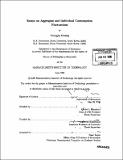Essays on aggregate and individual consumption fluctuations
Author(s)
Hwang, Youngjin
DownloadFull printable version (24.82Mb)
Other Contributors
Massachusetts Institute of Technology. Dept. of Economics.
Advisor
Olivier J. Blanchard and Guido K. Kuersteiner.
Terms of use
Metadata
Show full item recordAbstract
This thesis consists of three essays on aggregate and individual consumption fluctuations. Chapter 1 develops a quantitative model to explore aggregate and individual consumption dynamics when the income process exhibits regime-switching features, and compares its performance with the conventional linear model. For this purpose, I consider an economy populated by a large number of consumers whose incomes are subject to both aggregate and idiosyncratic shocks. The notable element of the model is that a latent regime-switching stochastic variable governs both the trend growth of the aggregate component and the counter-cyclical variances of the idiosyncratic components in individual earnings. I demonstrate that the model can provide a reasonable description of the cyclical behavior of actual consumption fluctuations, and can successfully replicate some key empirical properties of aggregate consumption growth, such as smaller volatility than income growth, greater volatility in recessions than in expansions, and a negatively skewed and leptokurtic distribution, while the typical linear model fails to do so. (cont.) The model highlights that the interaction between aggregate and idiosyncratic shocks, shifts in the cross-sectional distribution of individual consumers' optimal consumption decisions, and learning about the underlying business-cycle regime play a critical role in explaining aggregate consumption dynamics. In addition, comparison between individual and aggregate consumption and aggregation issues are addressed. Finally, I show that the regime-switching features, combined with heteroskedastic income risk, can account for more than 50% of aggregate consumption fluctuations, but less than 4% of individual consumption fluctuations. It is widely believed that utility maximization implies that expected consumption growth should be higher in recessions which are associated with higher income uncertainty because consumers with precautionary saving motives save more to tilt up their consumption path. Evidence in the literature, however, does not seem to support this prediction. Chapter 2 tries to reconcile these seemingly contradictory observations. First, noting that recessions are times of both higher income uncertainty and lower income growth, I perform comparative experiments to see each effect on expected consumption growth. (cont.) Higher income uncertainty indeed increases expected consumption growth, while lower income growth does the opposite. Next, in a calibrated switching regime income process example, where recessions are associated with lower income growth and higher uncertainty, I show the net effect may well decrease, rather than increase, expected consumption growth. I then compare my results to the usual argument in the literature, based on approximations to the Euler equation. Chapter 3 develops econometric methods to estimate consumers' risk aversion and time discount rate parameters in a dynamic stochastic general equilibrium (DSGE) model set-up, using the simulated method of moments (SMM) technique. This approach, based on a numerical solution algorithm, offers several advantages over traditional methods, which directly estimate a (linearized) Euler equation. In particular, the model allows us to incorporate a possibly non-linear underlying income process and the selection of moment conditions into the estimation procedure. I also consider two extensions by (1) allowing for the parameters of the model to be state-dependent and (2) incorporating the agent's learning about the latent aggregate state.
Description
Thesis (Ph. D.)--Massachusetts Institute of Technology, Dept. of Economics, 2006. Includes bibliographical references.
Date issued
2006Department
Massachusetts Institute of Technology. Department of EconomicsPublisher
Massachusetts Institute of Technology
Keywords
Economics.